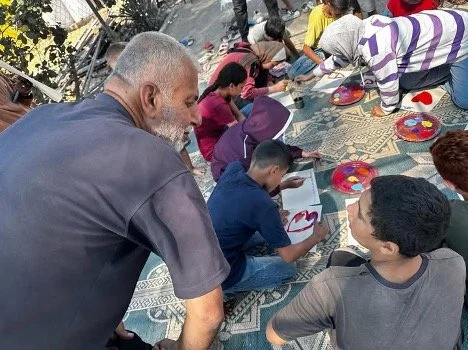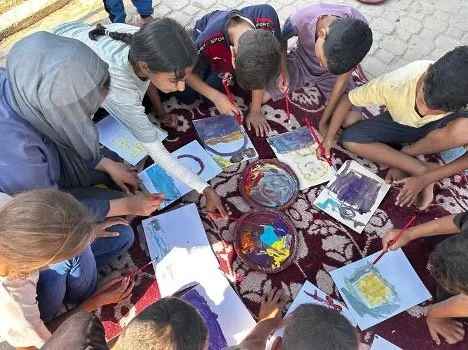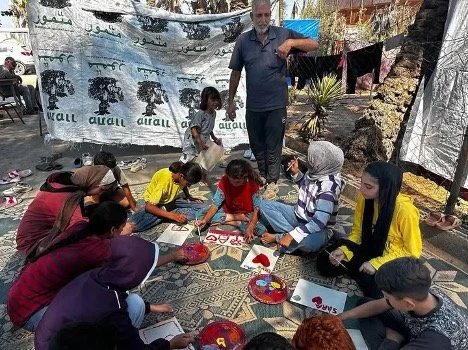Majed Shala
Born in Gaza, Majed Shala knew from an early age that he wanted to become a full-time artist. These days he is inspiring a whole new generation of Gaza’s children through his art workshops, under severely compromised circumstances. We are honored to highlight his work in this new feature article and we thank him for permission to use his photos throughout.
I’m very happy to be able to have this conversation with you Majed, and I’m hoping to learn a little more about your life and, of course, your work. Since our Phonetic Planet community shares an interest in childhood development perhaps you can begin by telling us a little about your own childhood?
Of course! I was born in Gaza city in 1960 and I studied in the city’s schools. At that time, it was a quiet and simple city. It was not that big and the population was not that large. Ever since childhood I have loved art and drawing. My mother encouraged me to draw since she also loved art and drawing. We would talk together while I was drawing.
At school, the art teacher encouraged us to use the artistic tools and materials that artists typically use, and not the tools that were overly simplified for children.
Of course, he supported the children who were especially talented in artistic expression, and I was one of them. I used to participate in art exhibitions hosted by various schools, and also take part in competitions sponsored by them. I was often one of the award-winning children, and I was pleased with these achievements.
At some of these art exhibitions, visitors would ask me what I would like to be when I was grown up. I always answered them with confidence: “I want to be a plastic artist.”
Majed, you mentioned that your mother encouraged you from your early childhood days. Did other people also inspire you?
Yes, my art teacher at school certainly encouraged me to practice the art of drawing and to use new techniques that we were exposed to in his classes. He supported me (and other talented children) in competitions and exhibitions at the national level. My older cousin also inspired me; he is ten years older than I, and I admired his drawings so much as a young child, I often used to try and imitate them.
Recently you have been using this artistic gift of yours to inspire a whole new generation of children in Gaza. How did you become connected with the Hope And Play charity? Tell us a little about your work in some of their programs.
I was nominated as an artistic mentor/instructor for this organization by a friend of mine, who felt that I have a strong ability to entertain displaced and refugee children including those who are in need of special care after losing their homes, their places of study, their schools or their clubs. I welcomed the idea and here I am, participating with them, guiding them and sometimes drawing together and supporting their personal development.
I try to bring happiness to these children by providing what I can provide, including entertainment and psychological (trauma) relief. I’m enjoying every minute because art certainly contributes to transporting children to a world that is very different from their reality.
We have also been lucky to chat with one of the trustees of the Hope and Play organization recently, and are really in awe of what can be accomplished when talented and determined people come together on behalf of children. Majed, I am hoping that before we end this conversation, you can provide us with some useful links whereby we can continue to discover more about your life as an artist and, of course, your continued mentorship of the children of Gaza.
Yes! Just google my name to find my artwork, or find me on Instagram @majedshala




